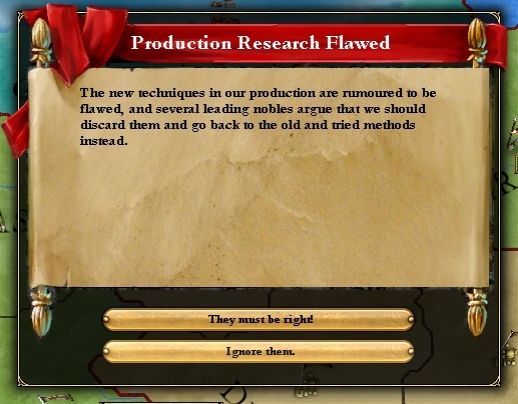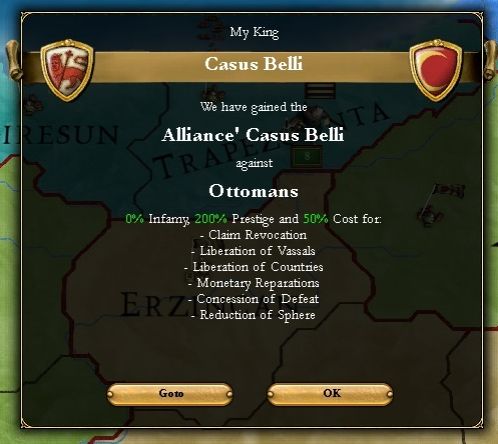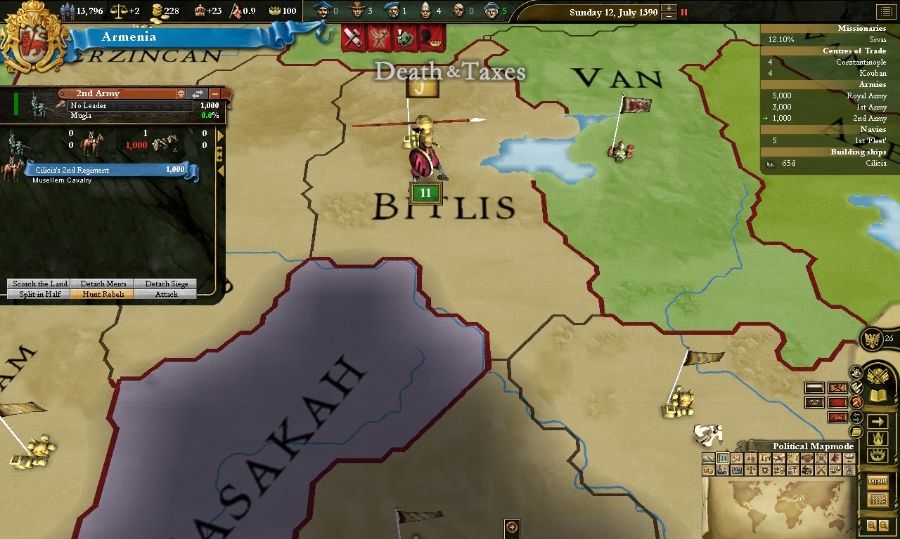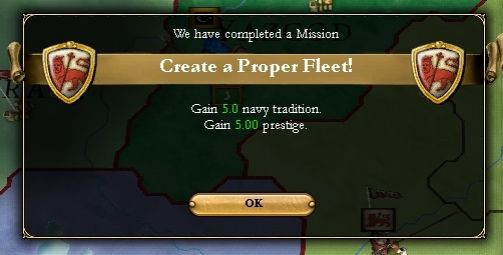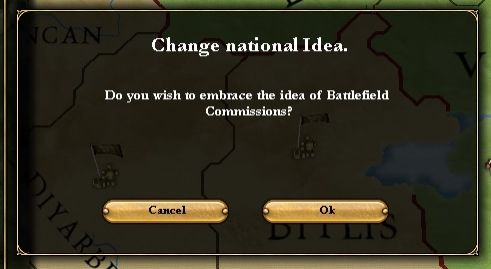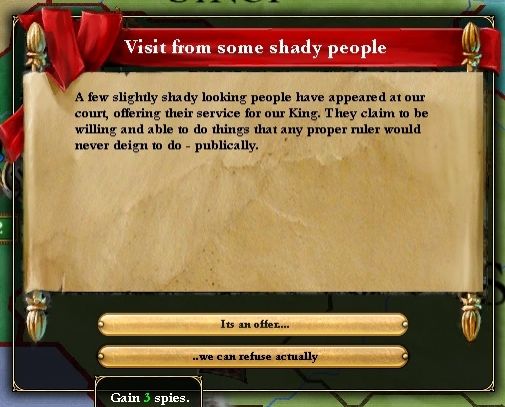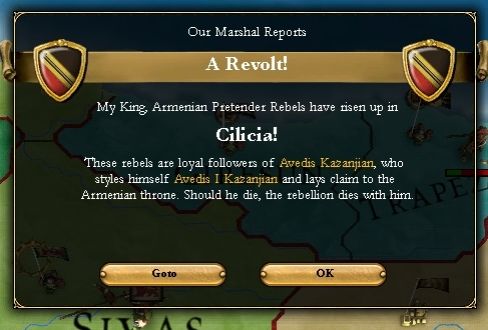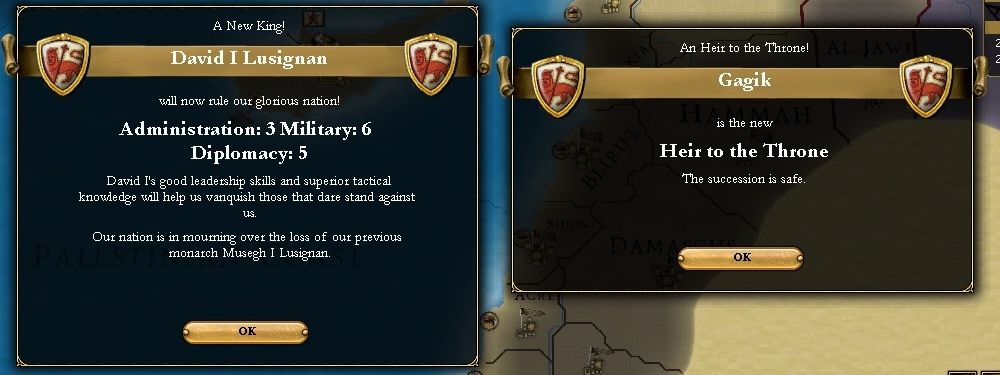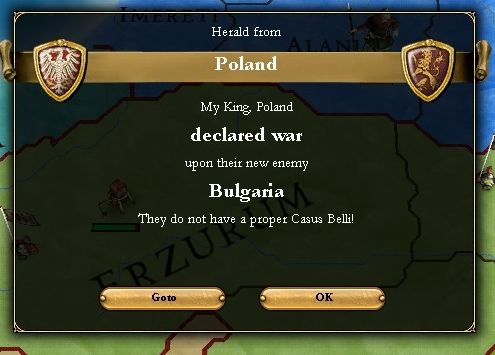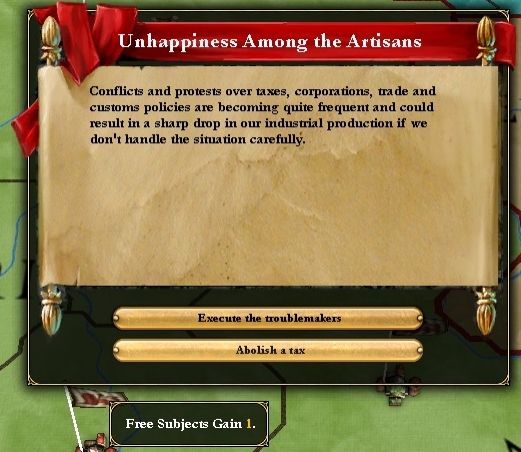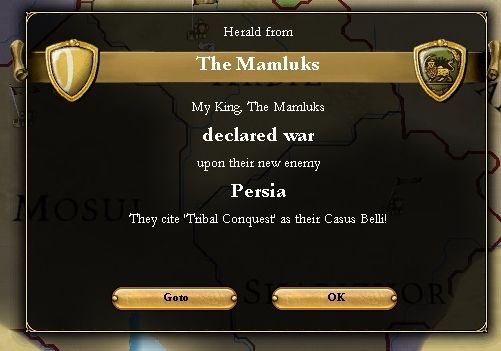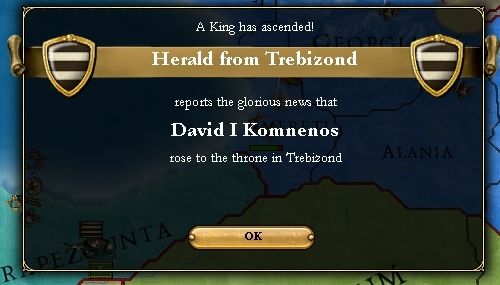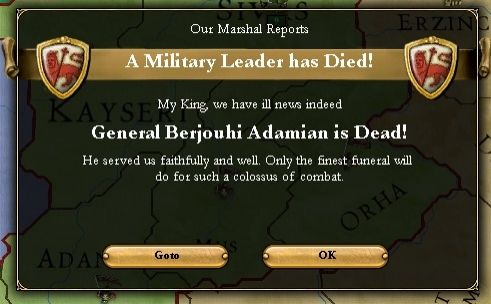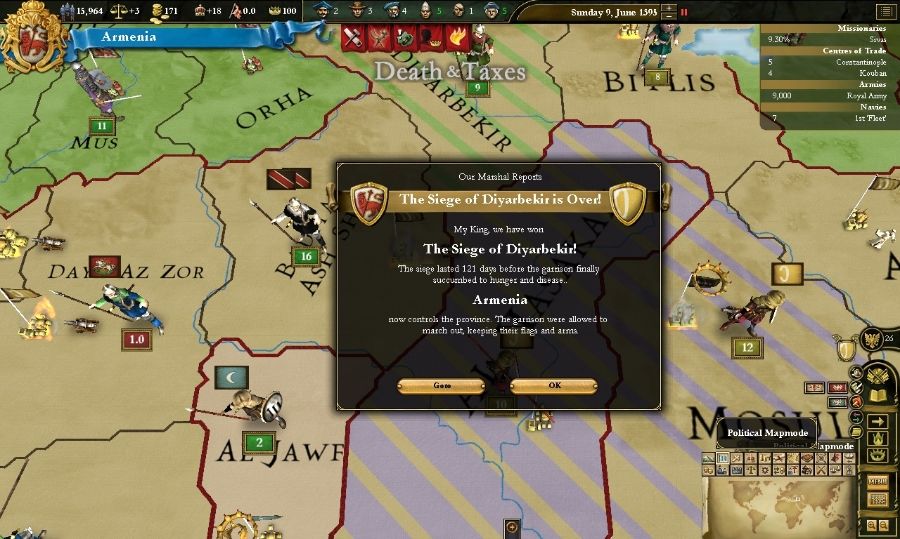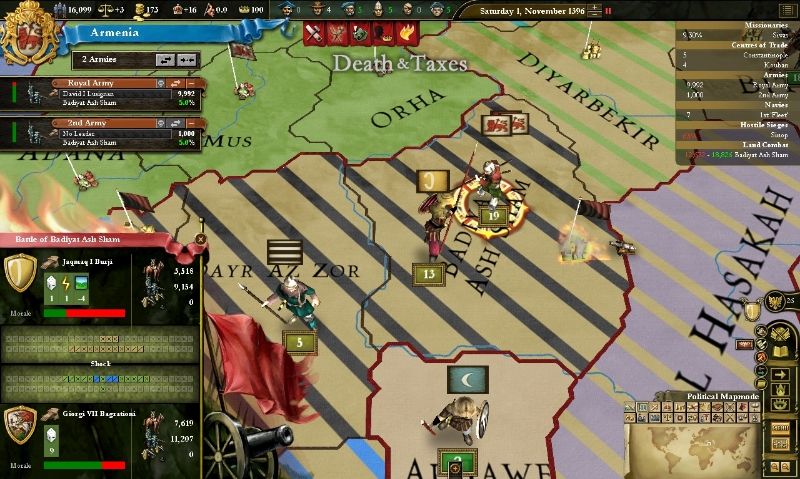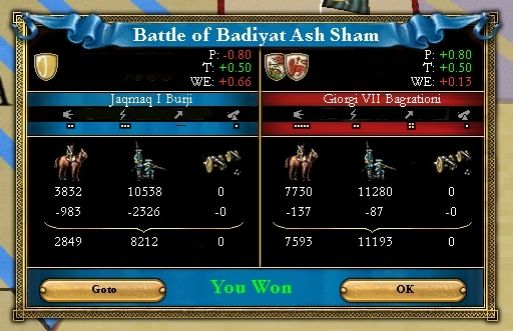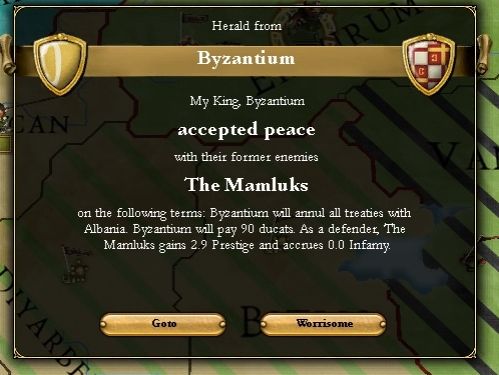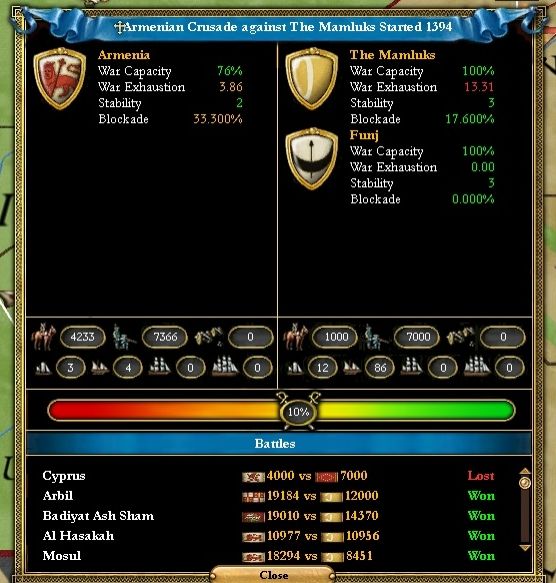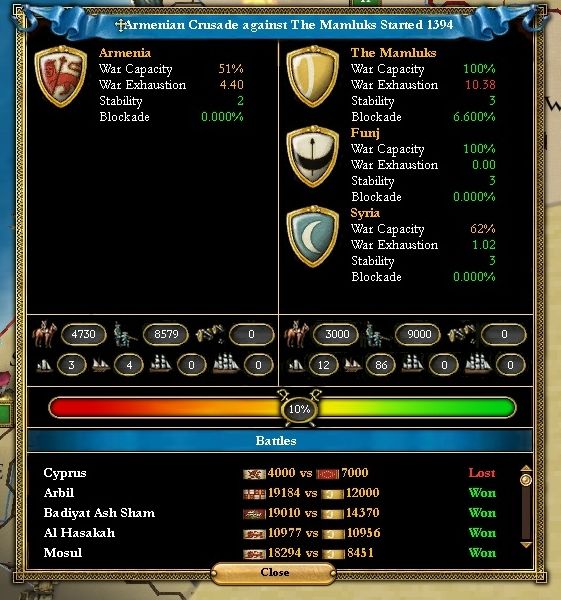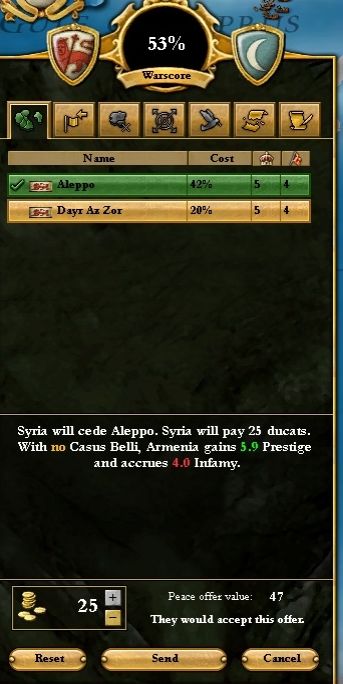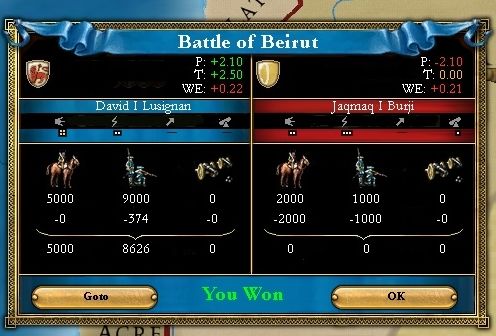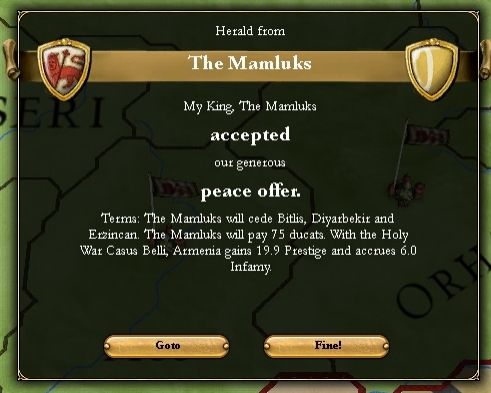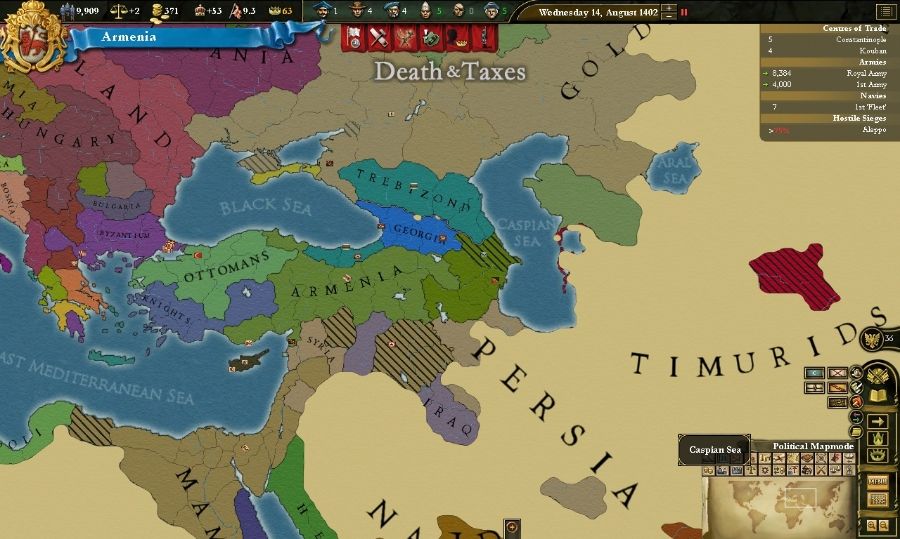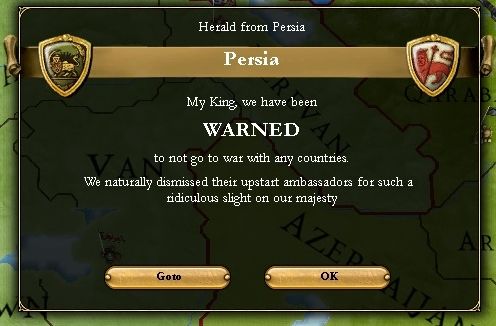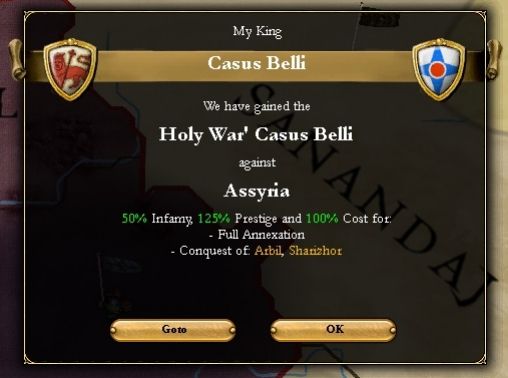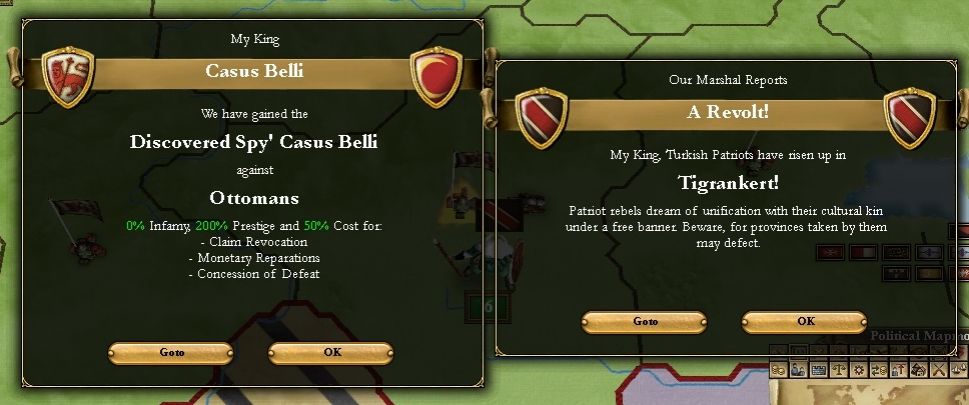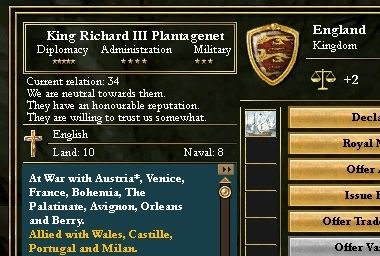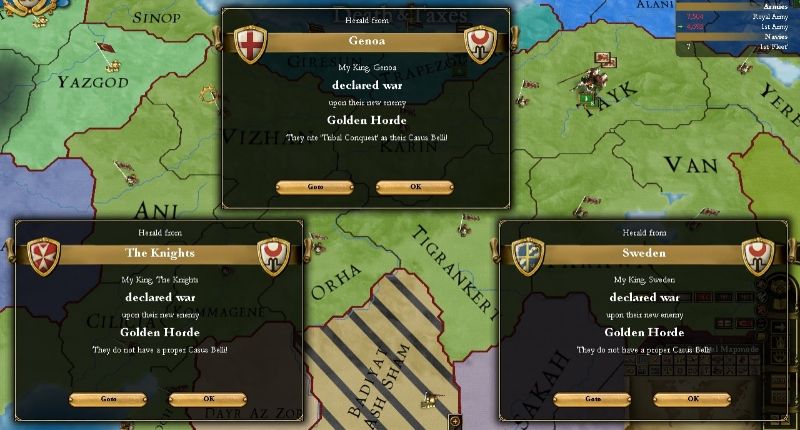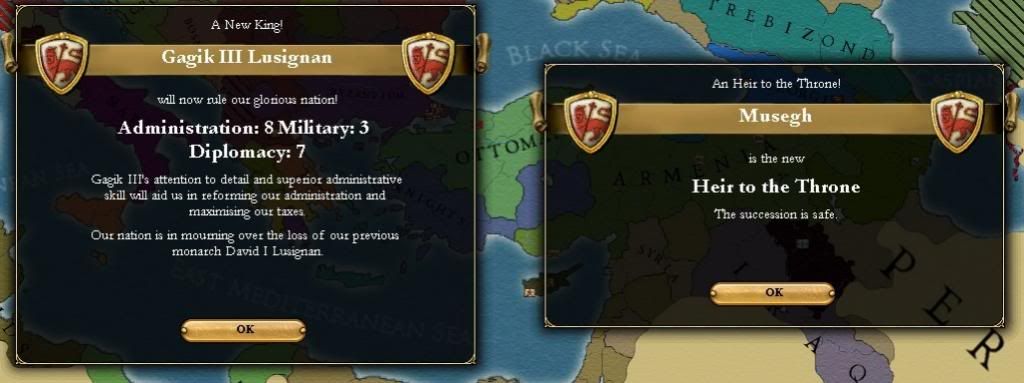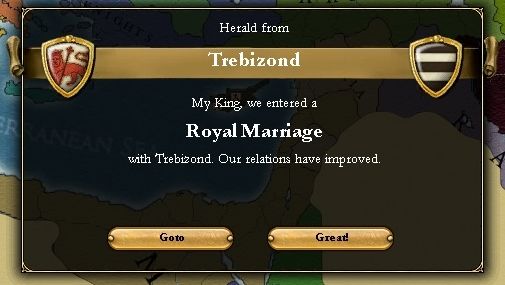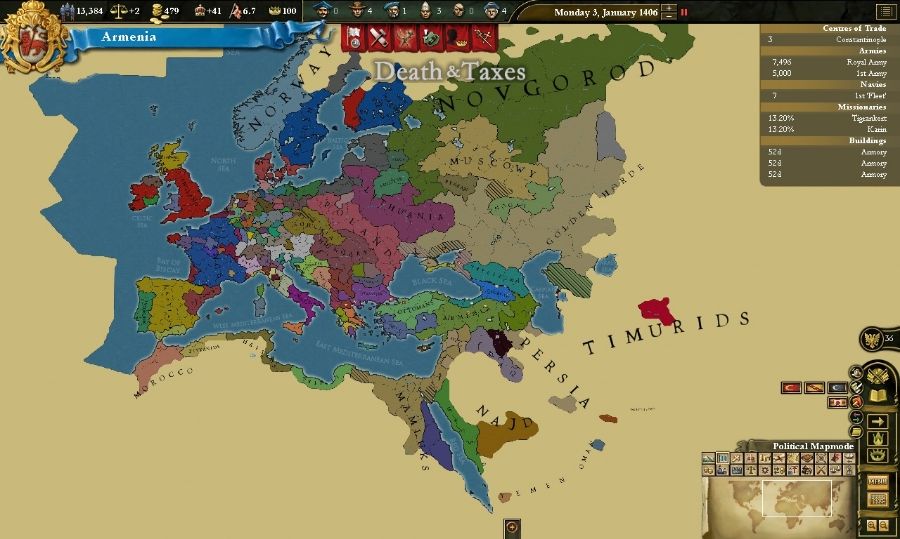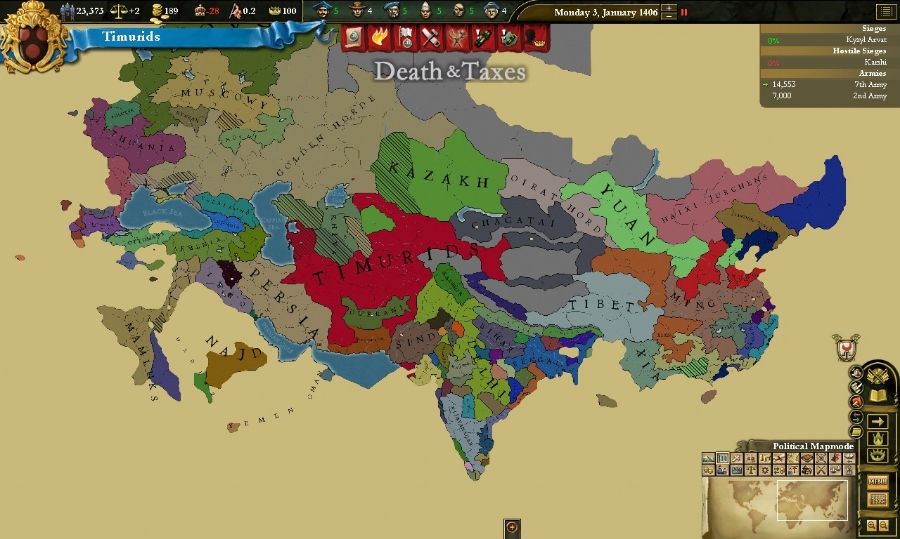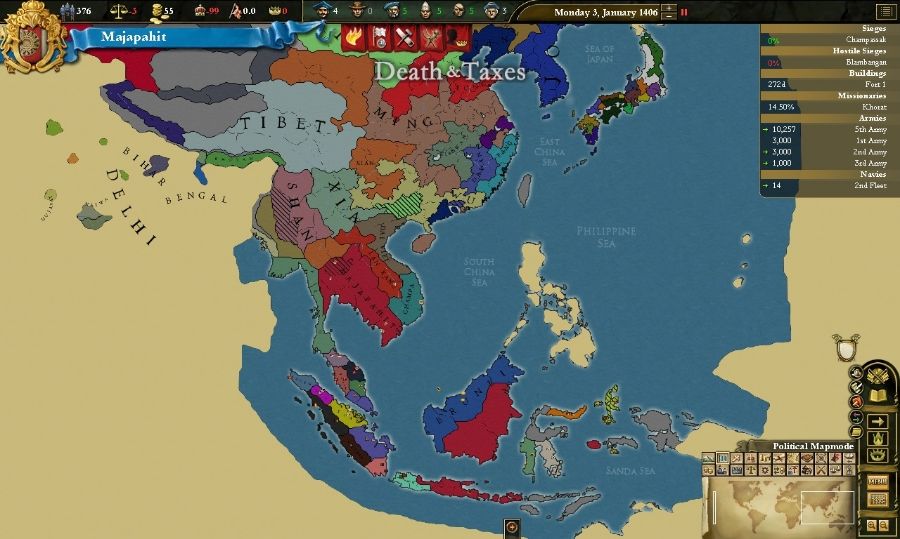Well, I'm going to go ahead and go with the full chapter here, though I am cutting out of a couple of non-war related screenshots (I can use them as material for the first post-war update). Here we go!
Chapter 13: The Armenian-Mamluk War: Part 2
Dramatis Personae
Armenia:
David I Lusignan-Komnenos, King of Cilicia and Armenia
David Bakara, Royal Diplomat
Mamlukean Syria, November 1396
The war with the Mamluk's was in full swing, had been for two or so years. The Armenian Army had been at the front lines the entire time, troops rotating back and forth as they helped the rest of the Orthodox Alliance siege the Egyptian territories. The Romans were working in Iraq, while the Georgians had pushed down deep into the Levant. The Armenian's themselves were helping Trebizond with the Corridor.
As for the enemy army, it was nowhere to be seen...fighting deep in 'allied' Persia. Or, at least they
had been. For as David lead his forces down into Syria after his cousins forces, they met up with a force of Georgians marching back north.
"What is going on here?" the King asked the commander of the Allied forces...who turned out to be none-other than the Georgian King himself.
Giorgi waved his hand in the direction of the Iraqi lines, "The Mamlukes are coming."
The Egyptians had managed to disengage from their foolish war of aggression, and were marching an army to attack the Orthodox forces in their heartland. Needless to say, David let Trebizond handle the sieges, and formed a defensive line with the Georgians. Once again, Armenian and Georgian troops would fight together against an Islamic enemy, this time in the enemies territory.
The Georgian spearmen formed the center of the line, set up in a standard formation to catch the (relatively) inexperienced Mamluk cavalry as they attempted a charge. The Armenian's formed the flanks of the allied army, their own cavalry battle-hardened from the war(s) with the Eretnids and New Candar. They would not charge so easily, not until it became clear it would work.
"Come on men!! Don't let them through the line!!" David shouted out, riding his own horse through the line, despite the occasional Mamluk arrow landing uncomfortably close to him.
A cheer went up from the Armenian lines...followed by the Georgians as their own King said the same thing in Georgian. The Mamluks were understandably rattled by the many loud shouts in languages none of them understood. They were already rattled by the northern spearmen and Armenian cavalry penetrating so deep into Syria, and the morale of the Allied troops just made it worse for them.
That being said, the Egyptian commander forced his men forward nonetheless, determined to break the lines of his enemies. Wave after wave of Mamluk infantry and cavalry charged forward. They brandished spears and swords, the steel glinting in the harsh sun as they ran forward. The previously cheering Allies faces set into stone, as they raised their shields and took the charging Egyptians head on.
"Push them back!!"
With a roar from the Allied lines, the Georgians and Armenians pushed forward, infantry supported by the much more numerous Armenian cavalarymen. The Mamluks reeled from the sudden attack, their already strained morale finally snapping as a general retreat was called. When the battle finally died down, barely more than 200 Allied soldiers lay dead on the field, mostly the brave Armenian and Georgian cavalry, less than a hundred of the experienced infantry having been lost. The Mamluks however...they lost over two thousand infantry, and nearly a thousand cavalry.
"Well done everyone!" David congratulated his men, as the tired Armenians began to march further south. Their morale was high, the very uneven battle against the Mamluk's giving them some much needed support.
-0-0-0-0-0-0-0-0-0-0-0-0-0-
Tarsus, Cilicia; April 1398
While the war had continued to grind on into its fourth year, unwelcome news began to filter into the capital of Armenia. Despite the Mamluk army having been, more or less, annihilated by the Romans and Persians in the east, a messenger brought bad news from Constantinople. The Romans had given up!
"Those cowards!!!" Bakara shouted as he read the message, angrily throwing it aside, old age doing little to sooth his temper.
"Apparently they were being invaded by the Moroccans," the messenger weakly replied.
"Bah, what can those North African's do? What happened to the Might of Rome?"
"It vanished with the Fourth Crusade."
Bakara snorted at that, "What of Trebizond and Georgia?"
The messenger sighed, "David, David Komnenos that is, says his economy is faltering under the strain of the war and he can't fight any longer. If those provinces in Russia are any indication, he's probably telling the truth. The Georgians are being invaded by the Moroccans too, and their army is still bogged down in Syria...they've had to withdraw from the war too."
"Add in Cyprus falling to th..." Bakara stopped, and a sound that somewhat resembled laughter came from his aging lungs, "the Moroccans are doing all the work in this war!!"
The messenger let a small smile cross his own face, "Indeed they are. Do you have any messages for me to deliver sir?"
Bakara drummed his fingers on his desk, before sighing and writing up a message in his rusty Moroccan, "Take this. We'll pay off the North Africans ourselves...we can't afford them invading from Georgia right now."
Despite the many victories in the four-year war, the Armenian's now stood alone against the Mamluk's and their vassals in Funj. That being said, all reports seemed to indicate the Mamluk's army was obliterated, and not even able to muster as many troops as Armenia alone could raise. Their navy could still take down anything sent against it, but the Egyptians were fast running out of troops and territory. Large portions of Egyptian Syria had declared independence (if disjointed), and the city of Beirut (that had fallen to roving Armenians the previous year) continued to hold down what remained of their once mighty army.
-0-0-0-0-0-0-0-0-0-0-0-
Syria, 1400
On the subject of the Syrians, the Mamluk's had been frantically sending diplomat after diplomat to their former subjects. Calls of Jihad against the Christian invaders met receptive ears. While it had been Armenian ducats that had funded their revolt in the first place, the Syrians were less than friendly towards their 'Infidel' neighbors (conveniently ignoring the quite cordial relations that the Islamic Qara Koyunlu maintained with the Cilicians). This may, or may not, have to do with the Armenian armies marching through Syrian lands on their way to siege more Mamluk provinces.
Regardless of the cause, in 1400 (the sixth year of the War) the Syrians joined the Mamluks against Armenia.
The fresh Syrian troops brought the numbers more or less to the same as the Armenians. David and his men held a slight numeric advantage (especially in cavalry) still, but his men had been fighting for six long years, while the Syrians were fresh and ready for the war. The only advantage the Armenians maintained was, while tired and warweary, the Cilician soldiers were far more experienced than the mostly militia-comprised Syrians. Their troops were holdovers from the revolutionary forces, armed with old weapons and little (if any) formal training.
-0-0-0-0-0-0-0-0-0-0-0-
"The Syrians are coming through the pass here," an Armenian Commander said, pointing at a map laid out in front of David on the frontline.
The King rubbed his beard as he looked at the movements the Syrians were making, "They are trying to flank us and hit Edessa..."
The newly renamed province (formerly known as Mus) was the closest Armenian territory to Syria, and it made some sense for them to hit it first. However, by moving their entire army there, it left the Syrians own territory dangerously exposed. It was either overconfidence in their erstwhile overlords-turned-allies, or the Syrians genuinely believed the Armenians were no threat to them.
"Let them," David finally said, ignoring the shocked looks from his officers, "we have more men, and can spread out to take their own provinces. Take enough Syrian territory, and we can force them out of the war before they can even
think about breaching our walls."
The experienced officers nodded, and set about splitting the Royal Army into various groups to take the Syrian territory. These groups did their jobs well, Aleppo and the strategic province of Dayr Az Zor were soon occupied by Armenians. The Syrian capital of Al Jawf and historic center of Damascus were under siege and expected to fall within the month.
(to explain the next part: the province of Aleppo fits Antioch more. Aleppo itself is somewhere around the border between the named province and Dayr Az Zor, on the side of the latter province)
It seemed like the Syrians realized this too, as they agreed to cede Aleppo to Armenia, the province being renamed to Antioch...a name it hadn't held since the fall of the Principality of the same name, in 1268. In fact, David restored the Principality as a State within Armenia, giving his cousin James the title of Prince of Antioch.
With the Syrians ejected from the War (and being sieged by Qara Koyunlu in an unrelated war) the Armenians once again began the long delayed push deeper into the Levant and into Egypt herself.
-0-0-0-0-0-0-0-0-0-0-0-0-
Beirut, September 1401
With the Syrians out of the war and Antioch restored, David moved his Royal Army of Armenia to Beirut. The town had been taken in the early days of the war, and the shattered Mamluk army had been attempting to retake it ever since. The Muslim army was unprepared, however, for the sudden surge of Armenians from the north. Fourteen thousand Cilician troops descended on three thousand Egyptians. The Mamluks never stood a chance.
The desperate fighters managed to take three hundred Armenian infantry with them, but it was in exchange for the last army the Mamluks had. Brave (and almost suicidal) scouting trips by galleys of the Royal Armenian Navy managed to find scattered Mamluk regiments trying to reform in Libya, and new units being raised from the old and very young Egyptians. But, the scouts also reported the entire Levant and most of Egypt was empty!
David was not one to look a gift horse in the mouth.
"Everyone! Onward to Cairo!!" the King shouted, marshaling his Army.
The Armenians, instead of slowly taking province after province in the vast Egyptian territory, made a mad dash for the capital of Cairo. It was a daring move, but the war was entering its eighth year, and few in Armenia were still supportive. The war needed to end
fast, before things could go worse.
-0-0-0-0-0-0-0-0-0-0-0-0-0-0-
And in the end, the gamble paid off.
When Cairo fell, the Mamluks finally admitted they were beaten by their norther neighbor. Armenia secured the Corridor, finally uniting the disparate parts of the Kingdom, and restoring the majority of its ancient holdings in addition to that (the money was a nice bonus too). And their eternal enemy in the Mamluks were crippled. Syria controlled most of its own territory, while Assyria was wracked with revolts the Mamluks couldn't put down. It would take them decades to recover from this war, if they ever did.
David had beaten Goliath (the fact the King was named David was added irony).
(I forgot to mention this but...Dat Trebizond...)
Thus ends the Armenian-Mamluk War. I got really lucky in them going to war with Persia. The Persians and their allies kept the Mamluk armies tied down most of the war, and weakened them to the point my own Army could finish them off. The Moroccans managed to force all my allies out (and make me pay
them) but they weren't enough to save the Mamluks. The next update will be a State of the World 50 years in (1406). Otherwise though, please comment I'm starting to wonder if I'm boring my readers

(not really, but comments
are always appreciated!)


